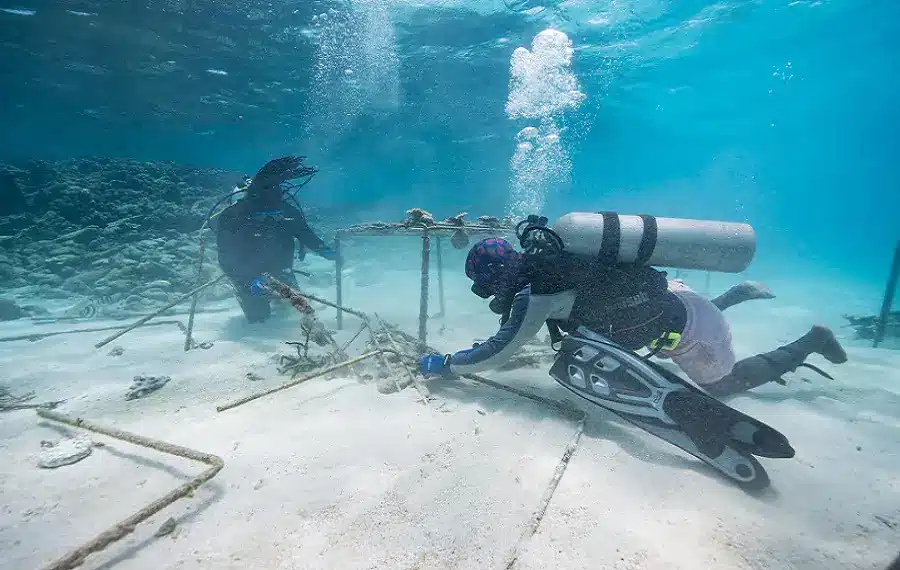- As Mayreau rebuilds on land, RVA helps corals recover
Coral gardeners in St. Vincent are preparing to help to replant coral reefs in Mayreau after the damage caused by Hurricane Beryl.
Last year, a coral restoration project in St. Vincent and the Grenadines (SVG) reported significant success, with more than 85% of the fragments that had been transplanted surviving.
CLEAR Caribbean, a not-for-profit organisation working in the Eastern Caribbean, had been working in partnership with the Richmond Vale Academy (RVA), Sustainable Grenadines, and We Are Mayreau on the project to scale up coral restoration in the Eastern Caribbean.
The Southern Grenadines, where Mayreau is located, has been vital to these efforts as dives in the waters of St. Vincent to search for coral colonies did not find any staghorn coral.
However, the teams got coral fragments from We Are Mayreau and Sustainable Grenadines in Union Island, which they brought back to St. Vincent.
Hurricane Beryl caused substantial damage in Mayreau with the government saying that the storm damaged or destroyed about 90 per cent of the buildings on the 1.5 sq. miles island that is usually home to 300 people.
Further, stakeholders in the marine sector have been reporting widespread damage to the seafloor and reef systems.
In early August, a month after the Hurricane, RVA sent a team to evaluate the impact of the storm on the coral restoration efforts in Mayreau.
“What we saw in Mayreau, as was the case on mainland St. Vincent, was dislodgement of bigger types of corals, like boulder corals and the stag horns,” Tobias Herberg, the coral project leader at RVA, explained after visiting Mayreau.
“The corals have been ripped up from where they had taken root and were tossed around. And this, of course, killed a lot of them.”
Herberg said that the NGO We Are Mayreau is in charge of the coral restoration efforts there. The project includes growing coral fragments in a nursery on tables under the sea and then transplanting them to the reefs.
The RVA team visited the coral gardens to assess the storm damage to the coral that had been transplanted, the reef itself and also assessed the tables in the coral nursery.
“The table structures that they have is not like a moving structure. So, when they have all the wave action, and especially since the hurricane passed over, we were concerned that all of that was ripped up and taken away with the storm,” he said of the tables that were full of elkhorn fragments.
The team also wanted to see the impact that the hurricane had had on the coral nursery and how to repair any damage.
“For the out plants that we checked, there was not any real damage, surprisingly,” Herberg said.
“Probably because the fragments are still quite young and quite small and don’t have a surface area large enough to really get hooked on by all the currents.”
Herberg said that the storm damaged the natural Elkhorn colonies but they still looked healthy and alive.
“I would say the out plants had significant damage, the natural colony had some damage, but they’re still alive and healthy and then the nursery tables, they got a quite heavy hit.”
However, as the damage on land in Mayreau was significant as well, the coral gardeners are focused on repairing their own homes and businesses.
Therefore, the RVA team looked at how coral gardeners from the mainland could help the Mayreau team with the nursery instead of just abandoning it.
“It’s understandable that the coral gardeners want to focus on their homes before the coral work. Now we are trying to find a system where we work together with them and assist them to make sure we can get the nursery up and running again — continue doing the out plants.”
Herberg said it is important to restore genetic diversity as that was the biggest blow to the nursery, which works as a gene bank.
“They lost a lot of different types of genotypes,” he said.
Having completed the assessment, the idea is to outplant as many coral fragments as possible before the end of September, when ocean temperatures are normally higher and coral bleaching events usually start.
RVA is considering sending a few coral gardeners from the mainland to Mayreau every two weeks to assist them with the outplanting.
Herberg emphasised that corals are important to fish stock because they work as a nursery and shelter smaller fish from bigger predators.
“So, a healthy reef with a lot of diversity of corals will then, most of the time, have a much higher diversity in fish.”
He said corals work as a barrier, especially in the Tobago Cays where there is a horseshoe reef.
“If you don’t have the type of branching corals that we work with, you will have fewer corals to break down the wave action before it hits our shorelines,” he explained.
